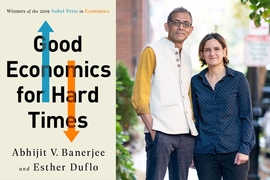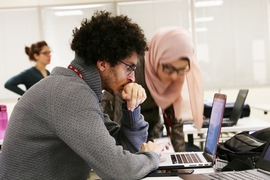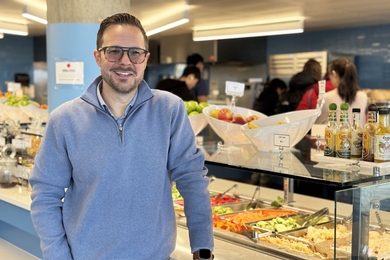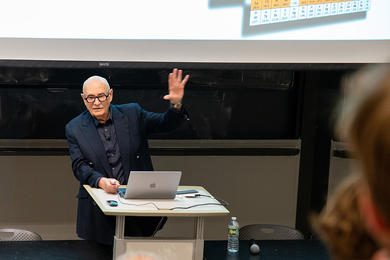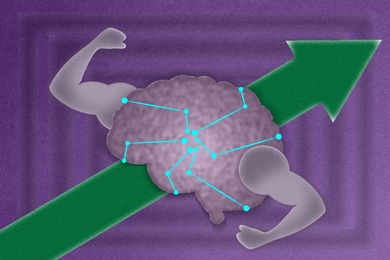The Abdul Latif Jameel Poverty Action Lab (J-PAL) at MIT is launching a new regional research center in the Middle East and North Africa (MENA) to focus on innovative research and policy engagement to reduce poverty.
Policy challenges in the MENA region are complex and interconnected: Children in the region have among the lowest learning outcomes, youth and women struggle to find quality employment, women’s agency is among the lowest in the world, environmental and energy resources are strained in many countries, and conflict has left many communities facing displacement and in need of humanitarian assistance.
Between 2011 and 2015, extreme poverty rates in MENA increased from 2.7 percent to 5 percent of the population, making it the only region in the world where extreme poverty rates were going up. The Covid-19 pandemic further compounds these challenges.
Despite tremendous effort and expenditure, the persistence of poverty suggests that policies and programs designed to reduce poverty are not as effective as they could be — in MENA, and around the world. In the face of these challenges, governments, non-governmental organizations (NGOs), and private sector firms in the region are innovating and developing new approaches. A critical question facing decision-makers is: Which of these approaches are most effective and should be scaled up?
J-PAL was founded at MIT in 2003 by Nobel laureates and MIT professors Abhijit Banerjee and Esther Duflo, with their colleague Sendhil Mullainathan, to address challenges like this by bringing an evidence-based perspective to poverty alleviation. J-PAL MENA is J-PAL’s seventh regional office, building on the success of established J-PAL offices at universities in Cape Town, South Africa; Paris, France; Santiago, Chile; Cambridge, Massachusetts; New Delhi, India; and Jakarta, Indonesia.
Building a culture of research and policy innovation
J-PAL MENA, based at the American University in Cairo (AUC)’s School of Business in Cairo, Egypt, will prioritize three main activities: research designed to inform high-level decision-making; policy engagement with governments, NGOs, foundations, and other organizations to bridge the gap between research and policy decisions; and professional training that helps build a culture of evidence-informed policymaking across the region.
"J-PAL’s regional offices are locally-grounded hubs for innovation, evaluation, and scaling,” says Iqbal Dhaliwal, global executive director of J-PAL. “For almost 15 years, our regional offices have forged close partnerships with governments, NGOs, and foundations and have supported the use of evidence in decision-making to improve the lives of tens of millions. With the launch of J-PAL MENA, I am thrilled that J-PAL will have a permanent home in the region and deepen our work with committed partners in Egypt and across MENA.”
The center will be led by J-PAL scientific directors Bruno Crépon, professor of economics and econometrics at ENSAE and École Polytechnique, and Adam Osman, assistant professor of economics at the University of Illinois at Urbana-Champaign.
The launch of this regional center builds on several years of research collaboration between J-PAL, AUC, and other partners in the region, led by Crépon, Osman, and other researchers in J-PAL’s network. This research addresses policy issues related to forcibly displaced populations, youth and female unemployment, financial inclusion, and the stunted growth of small and medium enterprises.
For example, a 2017 randomized evaluation by J-PAL’s Adam Osman and coauthors Ahmed Elsayed and Kevin Hempel tackles the problem of youth unemployment in Egypt, where the rate has hovered around 35 percent for years. The researchers partnered with a local NGO to evaluate the impact of their active labor market program aimed at increasing wage employment among youth. They found that the program was effective at increasing employment among women, while it had no impact on men’s employment. Insights like these can help inform the design and targeting of similar employment programs.
From Egypt to Morocco, Jordan, and other countries in the region, research collaborations focus on questions policymakers care about, creating a path for research results to inform policymaking in the Middle East and other regions facing similar challenges.
From startup to established center
J-PAL MENA is being launched in collaboration with global philanthropy Community Jameel, founded by MIT alumnus Mohammed Abdul Latif Jameel.
“The concept of supporting communities has been in the family’s heritage for 75 years, and this same concept has been key to J-PAL’s work around the world since it was founded in 2003. The announcement of the new office in Cairo will be instrumental in bringing J-PAL’s evidence-informed approach, which has already reached more than 400 million people, to our home region,” says Fady Jameel, international president of Community Jameel.
Looking forward, J-PAL MENA will seek to grow their center by hiring talented development economists and policy professionals to build on the existing work achieved to date, and by partnering with policymakers and academics in the region to evaluate the effectiveness of policies and programs.



